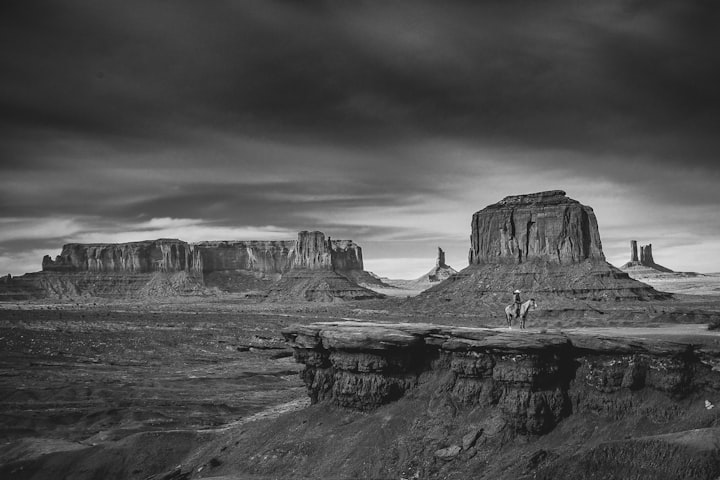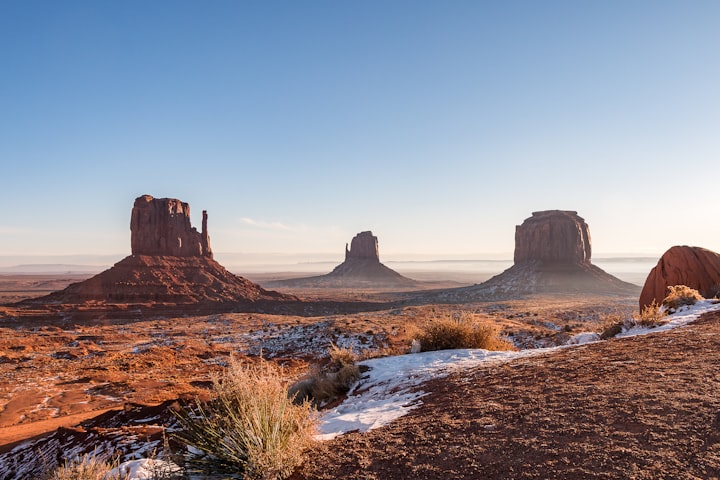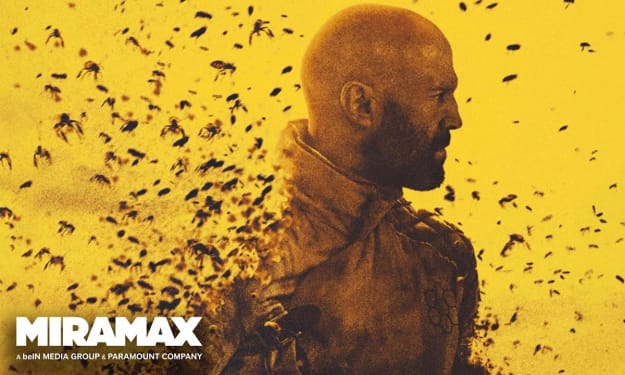
He arrives usually on horseback and is met with questioning eyes by strangers in town. The rider may not arrive seeking justice, but he will find a cause to fight for. He is a drifter. He is a professional. He is The Avenger.
His darker, mysterious past is etched on his face and his body language speaks of the weariness of his endless journey. He has come to make a stand and then, he will quietly move on. He has seen injustice and perhaps has participated on the wrong side once or twice, but his goal here is to leave this world having done one good thing, even if for questionable reasons.
Part lawman, part gunfighter, and always the outsider, the avenger is the first of the American superhero. When he rides into a strange town, we know there will be trouble. He expects trouble and he’s here to make one final statement, and take the side of right. Three films explore the avenger myth in three very distinct ways, and as with each, the hero’s fatal flaw dictates the final outcome. The Avenger seems forever trapped in a quest to leave his past behind.
1. Shane
George Stevens’ 1953 epic Shane, is the American movie-going public’s introduction to the “do-gooder” hero of Western lore. A slight, unassuming figure wearing tasseled fringes on his buckskin coat, rides up to a quiet farm owned by homesteader, Joe Starrett. The farmer is naturally suspicious at first of this strange visitor wearing pearl-handled pistols on each hip. Shane eases the tension by offering to move on, but only if no gun is pointed at his back.
Starrett relents and welcomes the stranger to his table. Within moments they become comrades in arms. Taking a job as a farmhand with Starrett is the catalyst that sets the remaining morality play in motion. Immediately, the questions arise regarding Shane’s motivation. Why here, tilling the soil and removing tree stumps? What is it in this mysterious man’s past that makes him replace his gunbelt for a “sodbuster’s” clothes?
The underlying tensions that are triggered by Shane’s decision to stay, reveal themselves through the middle scenes of the film. Joe Starrett convenes his neighboring homesteaders to convince them to take a stand and protect their land from the invading cattlemen. Shane plays the dutiful hired hand but keeps his distance, for now. This is not yet his fight.
Marian Starrett, the homesteader’s wife, tells her starry-eyed son Joey not to become too attached to Shane, while she becomes more attracted to the former gunslinger. She knows Shane harbors a violent history, which frightens and excites her at the same time. Will an opportunity go unrequited though the attraction is palpable?
Shane allows himself to be publicly humiliated at the hands of the cattle ranchers, opening the door to the bloody feud that will follow. When he returns later to defend his honor, it is Starrett who steps in to help, laying the groundwork for Shane’s role reversal at the film’s climax. Might versus right is on full display in the Western arena, the local saloon.
Is Shane striving to give meaning to his life, or is he bent on replacing Joe Starrett in the family household? His moral dilemma is played out subtly during three key scenes. Standing in outside in a downpour, watching the Starrett family through the window, Marian implores Shane to come in out of the rain. Rather than accept the invitation to come into the warmth, Shane simply walks away to sleep in the barn. He shuns the chance to move in on Starrett’s territory. The superhero’s eternal burden is the inaccessibility of a ‘normal’ life.
In the second morality scene, Shane teaches the boy, Joey, how to wear and shoot a pistol, demonstrating his prowess with a six-gun in the process. Like a father figure, he explains to the boy the permanence of killing another man, and that a gun is a tool like any other on the frontier, to be used with care and purpose.
Finally, when Starrett decides to have it out with the ranchers after their hired gunfighter, the infamous Wilson shoots his friend and neighbor in the muddy street, Shane at first is willing to let Joe go to avenge the killing. Marian pleads with Shane to stop her husband from going to his certain death. Shane now must wrestle with his notion of a fair fight.
Shane is suddenly faced with the stark truth that is his life, and one he can never shed. Living up to his reputation and his nature, Shane returns to the saloon for the final shootout. Young Joey is present to witness the scene, and even warn Shane about the hidden rifleman upstairs. The boy’s hero worship is solidified as Shane guns down the gang of ranchers and their hired gun.
Though Joey pleads for Shane to come back, the hero knows he must move on. There is no quiet life for him here. Wounded in the gunfight, we are left unsure if he even survives the ride away. Is there another town, another homestead waiting for the skills of a gunslinger to stand in their place?
2. Ride The High Country or (Guns in the Afternoon)
Sam Peckinpah’s 1962 depiction of an ending era in the Western frontier, tells the story of two ex-lawmen hired to transport gold from a mining community down the hills of California and into town. Reduced to the status of a glorified security guard, Steve Judd arrives in town to fanfare and street parades, but neither are for him. Judd’s time as the respected gun is over, and his old friend and former partner Gil Westrum, is now working as a sideshow spectacle in wild west shows.
Peckinpah establishes his penchant for portraying men whose time has passed with this dark morality play on the muddied waters of right versus wrong. Two former lawmen passed their prime and their usefulness to society, are forced to find new ways to earn their living.
Judd hires Westrum and his young carnival sidekick, Heck Longtree to ride along as guards for gold he will bring down the mountain from a mining camp. What Steve seemingly doesn’t know is, that Gil and Heck are planning to rob the gold and leave Judd behind. The trio rides up the trail together toward the camp, and tensions begin with the elder statesmen educating the headstrong Heck in the ways of their experience. Judd senses this boy will give him trouble, but he now must rely on both men if he expects to succeed.
The three riders stop at the ranch home of Christian homesteader Knudson, whose beautiful daughter Elsa is bent on escaping her father’s firm grip, to find her true love Billy Hammond, and marry him. Heck is naturally smitten with Elsa’s beauty and begins to have desires of his own.
There are no subtleties to the forces at play in this film. During dinner, Knudson and Judd share bible quotations, with the farmer projecting the folly of trafficking in gold. Meanwhile, Heck finds Elsa alone in the moonlight after supper and tries to woo her. Knudson finds them together and punishes Elsa for her wicked behavior.
The next morning when the men set off for the mining camp, Elsa catches up on horseback and insists on tagging along. She is naive and mostly innocent, but she must escape her father’s clutches. The old hired guns are reluctant but agree to allow her along. When they arrive at the camp, Elsa finds Billy and prepares for her wedding.
With Peckinpah’s influence as a filmmaker, the rawness of western frontier life and the changing times that civilization brings is put on display in Ride The High Country. No longer is the professional considered a superhero. Instead, he’s been reduced to a hired hand. Steve wants to complete one last job as an honorable gunman, get paid, and regain some self-respect. Gil who trades on the aura of the gunfighter in his carnival act, recognizes hie time has passed, intent on getting what he thinks he’s owed.
In the mining camps, there is no need for churches or courthouses. The scales of justice are balanced with trickery and deceit. Morality lies in the hands of the powerful. The power here belongs to the purveyor of pleasure, the saloon and brothel owner.
Elsa’s innocence is exposed to all in attendance as she’s taken to be married in the local saloon, slash brothel. Presided over by a drunken judge and the brothel’s madame, Elsa is married to Billy in an absurdly surreal ceremony. She learns almost too late that her husband intends to prostitute her to his brothers and most likely anyone else who will have her afterwards.
Until this moment in the narrative, Judd has been all business. His only interest is in doing the job and getting paid. But, Heck has stepped in to save Elsa from her would-be assaulters, and Judd is forced into a moral decision. A kangaroo court is called by the locals, headed by the whorehouse madame. To have the marriage annulled, Judd must trick the judge into changing his verdict by confiscating his license. When the trio escapes with Elsa and the gold in trust, the judge is beaten by the camp dwellers for allowing this travesty of frontier justice.
Steve Judd’s chances of success are confounded further by Westrum and Heck’s plan to steal the gold. The two men discuss western values on the way down the trail. Gil sees their situation as an opportunity to get their due for years of thankless service. Judd is seeking redemption for his wilder youth saying finally, “All I want is to enter my house justified.”
Judd has had an inkling all along that Westrum and Heck were being less than honorable, but the presence of the girl has created a change in Heck even while they are trying to steal the gold. Judd confronts Gil for attempting to deceive him just as Billy and his brothers arrive to get Elsa back. The ensuing gunfight leaves Judd alone with the girl, and Heck as his prisoner.
Gil escapes and circles back to the scene of the gunfight to take one of the dead brother’s horse. He follows Judd and his charges down to Elsa’s family farm. where Billy and the remaining Hammond brothers lay in wait. They’ve killed the father and left him to appear as if he is bowed in prayer. The trap is set for Steve, Heck, and Elsa.
As the inevitable gun battle rages on, Judd and the young couple get pinned down in a ditch. Gil Westrum arrives to witness the scene that has put his old compatriot in jeopardy, and in a fit of conscience, he helps them defeat the Hammonds. In avenging the death of Elsa’s father and the plan to share her virtue around camp, Heck wins the girl’s love and gratitude, Gil has returned to his senses, and Judd, who always knew that Gil would see the light, dies of a mortal gunshot wound. Neither man escapes his past, but both achieve their rightful place.
3. Unforgiven
Who else but Clint Eastwood could bring the 'Avenger' myth full circle to a diametrically opposed conclusion. In 1992, Unforgiven was an unlikely Oscar winner from a bygone era. The Western had been shelved for the excitement of special effects movies. When Eastwood’s opus hit the screens, this one last great Western was more a pronouncement than a last gasp of the genre’s power to fill seats.
The story of Will Munny, a former gunslinger turned hog farmer, proceeds to unravel all the romanticism of the great western hero. Munny is convinced by a snotty, self-professed gunfighter kid to help him avenge the mutilation of a prostitute in the town of Big Whiskey. The brothel’s residents have put out a bounty of $1000 to the man or men who kill their friend’s attackers. The widower Munny needs the money to see his young family through the winter, so at last, he agrees to ride with the Schofield Kid, but only if they bring along Will’s former partner, Ned Logan.
Munny and Logan were once the worst kinds of gunmen when they rode together. They killed without conscience until Munny’s wife reformed him somehow, making him a father and gentleman farmer. Will and Ned have grown old and outdated over the past ten years. Munny’s wife has been dead three years and left Will with a responsibility he’s never known before.
The Schofield Kid as he calls himself is a punk of dubious reputation and poor eyesight, but he has the information they need to collect the bounty. If The Kid is a representation of a grown-up Joey from Shane, he is the last of an idolizing youth bent on following in the footsteps.
This film is set in the twilight of the great gunfighter era, at a time when towns are becoming cities with civilized laws. Big Whiskey is the antithesis to these kinds of towns, run by a ruthless sheriff, Little Bill Daggett, and the town’s saloon will be the appropriate setting for what could be described as an era’s unglamorous last stand.
Bounty hunters have come from far and wide to collect the “whores’ reward”, including English Bob, an aging British gunman of dubious repute. He is introduced to us on the train ride to Big Whiskey, waxing poetic about the vagaries of democracy in the aftermath of Lincoln’s assassination. Along for the ride to collect the thousand dollar bounty is his personal biographer, W.W. Beauchamp.
Writers of the period were well known for their colorful documentation of famous gunfighter heroics. When English Bob is taken away in chains, Beauchamp stays in town to witness this event’s ultimate end. His character epitomizes the wordsmiths that created our future image of the men in folklore.
Beauchamp and the Schofield Kid learn the true meaning of taking a life in their own way.
“Hell of a thing killing a man. You take away all he’s got, and everything he’s gonna have.” — William Munny, Unforgiven
The reality of ending a man’s life whether good or bad is too much for the Kid to accept, and he vows never to lift a firearm in anger again. For Beauchamp, the awakening is just more fodder for future publication, always keeping a careful distance to get the full story.
Unforgiven is a tale of bygone days when gunmen ruled with the quickness of youth and the fears of others. Now, at the end of an open frontier, the players are aged and their temperament has lost its edge. That is until Little Bill makes the mistake of pushing too far.
The closing scenes of Unforgiven still play out as a final stamp on the Western myth of the avenging hero. Clint Eastwood saves his last silver bullet to shoot a hole in the glorification of the gunslinger. A gun for hire meting out frontier justice has lost its luster in the newly tamed West.
This story originally appeared on Medium by Stuart Englander
I hope you enjoyed reading it.
All tips are gratefully accepted for my future musings.
About the Creator
Stu E
Every Life is a Story-Every Story has a Life. I love to write stories to inspire. Biographies, film reviews, and a touch of humor. Life is for learning, always.






Comments
There are no comments for this story
Be the first to respond and start the conversation.